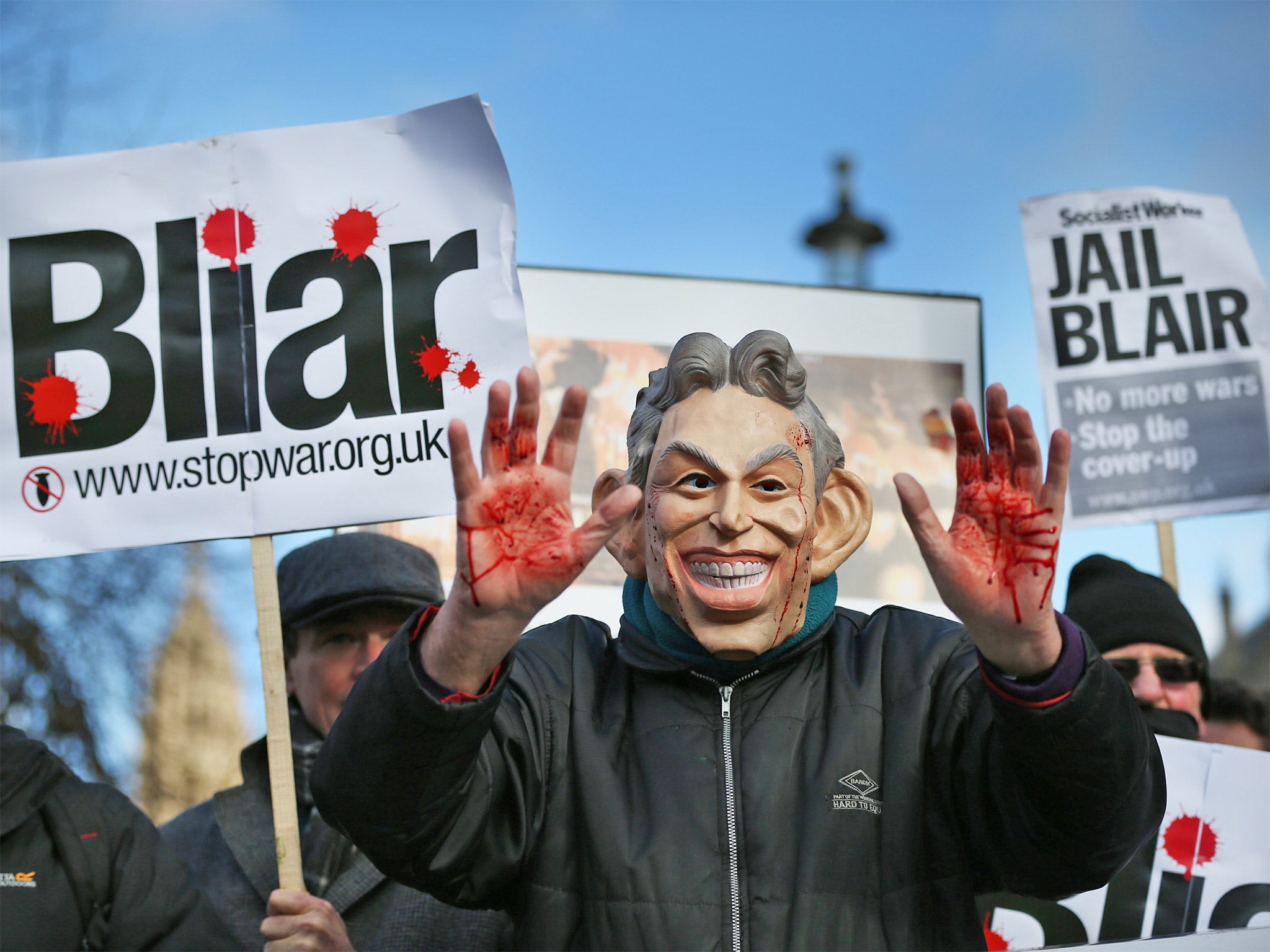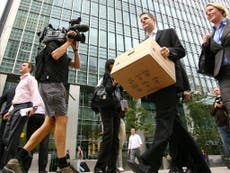Thinking of voting for Brexit? Don't forget how the media manipulated you into believing in the Iraq War
Two thirds of the public were against war in Iraq in February 2003 - yet by the time MPs voted on it in March, 52 per cent were for it, after a steady onslaught of pro-war, anti-Saddam media intervention led by politicians


The Leave lobby cried foul (no surprises there) when it emerged last month that the Iraq Inquiry’s report would not be published until after the referendum. They must be congratulating themselves today on not having cried louder. The real victims of the delay have been the Remainers.
Imagine if we were going to the polls with Sir John Chilcot’s report fresh in our minds – if it had been published, say, on 6 June rather than 6 July. You don’t have to know what’s in the report to picture the immediate fall-out: an orgy of self-righteousness, with a million commentators vying to deliver the most savage excoriation of Tony Blair and, to a lesser degree, of whichever generals, spooks, mandarins and kitchen cabinet henchmen are named and shamed with him. Yet imagine that the public kickings had been administered; that the Brexiteers had spent a few days holding up the recipients’ failings as further evidence of the moral bankruptcy of the “political elite”; and that a week or two had passed. What would have been the impact of the report then?
The most certain effect of the report, whatever its timing, must be this: to make us think about the invasion of Iraq – to call to mind those half-forgotten months in 2002 and 2003 when a long war of ideological attrition saw us slowly transformed from a nation without the slightest thought of initiating military action against Saddam Hussein into a nation at war, trapped in a “pact sealed in blood” with President George W Bush – and steeped in the blood of British troops and Iraqi civilians.
Such remembering is hard to do without asking oneself the question: how could we have allowed ourselves to embark on such a catastrophically reckless course? And it is when we try to answer that question that the relevance of Chilcot to tomorrow’s referendum becomes clear.
Think back to the invasion with even a modicum of honesty and you will remember an awkward but undeniable fact: Blair and his cronies did not act alone. There was another, more nebulous villain: public opinion.
We tell ourselves today that most people opposed the war. At one point, they did. More than a million people marched against it in February 2003, at which point opinion polls showed opposition to the war (assuming neither a new UN resolution nor proof being found weapons of mass destruction) from roughly two-thirds of the public. Yet by the time MPs voted to back the war – in March 2003, by a crushing majority of 412 to 149, with neither a new resolution nor proof of WMDs having emerged – more than half of the British public (52 per cent) told YouGov that they would have done the same. An average of 54 per cent remained in favour, in 21 subsequent polls, for the rest of that year.
Looking back, it’s hard to imagine how anyone could have failed to spot the catastrophic risks of invading Iraq. In 2003, millions did; or, if they didn’t actually fail to see them, ultimately closed their eyes to them. Somehow, a once-outlandish proposition had been normalised. For all the opposition (in which The Independent played an honourable leading role), public opinion was more or less won round – and an instinctive collective sense that avoidable pre-emptive wars of uncertain outcome were best avoided ceased to be an effective barrier to action.
Why? Step forward the opinion-changers. For more than a year, the public had been told again and again, eloquently and, supposedly, authoritatively, that supporting President Bush’s adventure was both the right and the prudent thing to do. Some, such as Iain Duncan Smith (in unfamiliar guise as Washington Times contributor and, later, pamphleteer), were lobbying for action against Saddam as early as 2001. By mid-2002, much of the British media had joined the chorus. The Murdoch papers were loudest, especially The Sun. But the Telegraph and Express papers joined in enthusiastically too, as did (to a lesser extent) The Observer.
The growing volume of the chorus was hard to resist. A star Telegraph columnist (Boris Johnson), after several months of arguing the opposite, reversed his position and assured readers that attacking Saddam would “make the world a better place”. The London Evening Standard, with a little help from Alastair Campbell, warned us that we were “45 minutes from attack”.
Not absolutely everyone was persuaded, but those who disagreed were denounced as appeasers. “Saddam’s useful idiots” was how one Times columnist (Michael Gove) described them. In the Telegraph, Boris Johnson, warming to his new position, justified sending young men to fight and die with the thoughtful observation that “Saddam is a great acne spot on the otherwise beaming face of the earth, and it is time he was squeezed”.
Does any of this ring a bell?
We must not be disingenuous. Not every cheerleader for the Iraq war went on to become a Brexiteer. Few were more vociferous than George Osborne. But it’s the process as much as the bunch of protagonists that feels depressingly familiar: the blithe dismissal of risk; and the relentless, well-financed lobbying that hammers away, via the press, at public opinion then, through sheer weight and persistence, allows a once-outlandish policy proposal to become first thinkable, then respectable, and ultimately, if we’re not careful, real.
Fourteen years on, here we are at another crossroads in our nation’s history, being asked to support a policy gamble of breathtaking risk. Enthusiasm for the policy itself was once confined to the Conservatives’ lunatic fringe, but the deep pockets of Brexit donors such as Arron Banks and Peter Hargreaves have helped to normalise it. Even so, common sense sounds its alarm bells, but those who draw attention to them are denounced for their pusillanimity. Doing nothing, we are told, would be worse.
Over time, the repetition of the optimists’ message takes the sting out of our doubts. Perhaps it’s not quite as bad as all that, we reassure ourselves, if so many well-briefed people are in favour. Perhaps, after all, it will all turn out all right. I remember comforting myself with such reasoning in 2003; and thinking, too, how glad I would feel if my fears proved ill-founded. This time, too, I would love to be proved wrong.
But I fear the worst. I fear that a golden age of post-war European peace and prosperity is about to be brought to an end, for reasons that future generations will struggle to fathom. It is scant consolation to imagine the excoriation that will be heaped upon Boris Johnson and Michael Gove, a decade or so hence, when the put-upon working classes they have seduced with their gung-ho rhetoric realise that they, disproportionately, are paying the price for it – just as their sons did for Tony Blair’s. Perhaps – who knows? – we may even set up an inquiry.
But you can be sure that Brexit’s cheerleaders in the media, who by then will have long since moved on to their next brilliant wheeze, will not be in the dock. That’s the joy of punditry: you never are.


Join our commenting forum
Join thought-provoking conversations, follow other Independent readers and see their replies